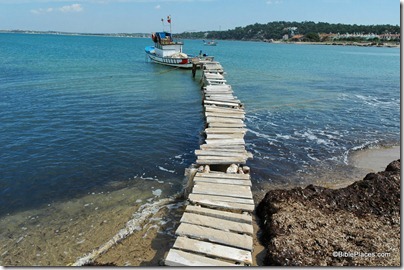Apparently one fisherman grew tired of wading from his boat to land each day and built himself a little dock. This rickety walkway does nothing to remind the visitor of the glory of the ancient city of Troas and its important harbor, long reclaimed by the ocean.
The apostle Paul passed through the port several times, beginning with his first trip to Europe and the city of Philippi (Acts 16:8-10). Luke joined Paul at this time, based on the first occurrence of the first person plural in the narrative.
On his third missionary journey, Paul returned this way to visit friends as he traveled to Jerusalem.
His lengthy oratory put Eutychus to sleep, an event which might have gone unnoticed had not Eutychus been sitting in a window on the third floor (Acts 20:9). As the NET Bible puts it, “Fast asleep, he fell down from the third story and was picked up dead.”
Some have suggested that following his release from prison in Rome, Paul was later arrested in Troas. This would explain why Paul left his cloak and scrolls there, and why he requested that Timothy bring them to him quickly (2 Tim 4:13).
Strabo called Troas “one of the most famous cities of the world,” but by the sixth century, its harbors were apparently silted up and the city was no longer a significant crossroads in the Byzantine empire.

One thought on “Photo of the Day: Dock at Troas”
I've long been stuck by the parallel between the account of Paul's vision in Troas (Acts 16:8-10) of a Macedonian man exhorting the apostle to leave Asia and bring the gospel to Europe, and Josephus' account (Antiquities of the Jews (Book 11, Chapter 8)) of Alexander the Great's meeting with the Jewish high priest in Jerusalem. The stunned Macedonian conqueror described the high priest as the man who had appeared to him in a dream while he was still in Europe and who had beckoned him to cross the sea to Asia. Both concluded that their visions had been divine callings to spread their respective gospels – Christ and Hellenism.
While the story of Alexander and the high priest is generally considered apocryphal, it still could have been widely told in the first century and, if so, must have resonated with Paul and those he told of his Troas dream.